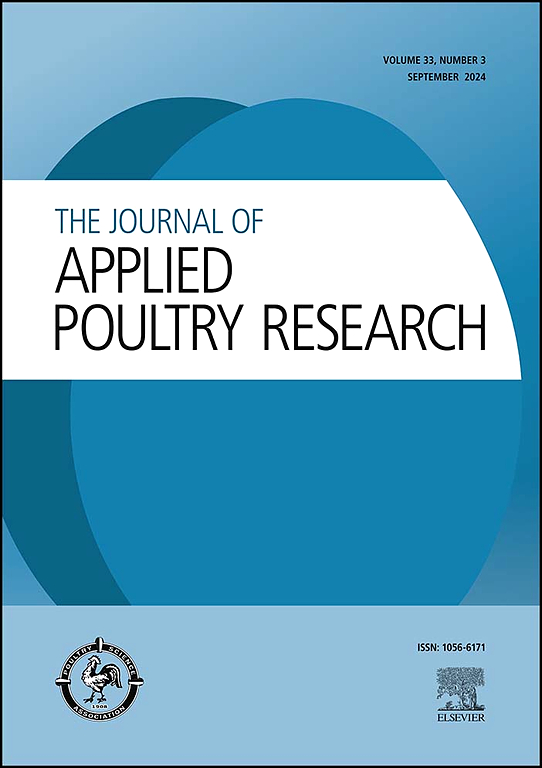在密闭房屋内操作无人机和自动驾驶车辆,协助房屋管理
IF 1.6
3区 农林科学
Q2 AGRICULTURE, DAIRY & ANIMAL SCIENCE
引用次数: 0
摘要
许多集成商要求家禽饲养者每天至少巡房一次,以观察家禽并检查环境条件,以便及时做出改变,优化家禽的表现和健康。现在,禽舍平均宽约 54 英尺,长约 575 英尺。这就需要饲养员每天花费大量时间来巡视,同时充分关注所有活动。无人机能够有效地扫描鸟类和环境,收集数据,并远程访问房舍内的情况,以指导管理决策。在一项初步实验中,无人机在一个商业设施中每周运行 1 次,每次 1 d,有时与地面机器人一起在 1 个鸟舍的一半区域运行。基于区域运动曲线的分析被用来比较运动效果。在死亡率、耗水量和饲料转化率方面,实验鸡舍的表现与同一农场的其他 3 个鸡舍相比没有统计学差异。其他运行自动驾驶车辆的实验也未报告对性能有显著影响(Dennis,2019 年)。这意味着无人机和其他自动驾驶车辆可能成为肉鸡舍管理的额外工具,在农场劳动力难以找到和留住的情况下提供更多的灵活性和能力。集成系统可以对扰动做出更灵敏的反应,从而做出更及时的管理决策,改善鸡舍条件,提高鸡的性能和福利。本文章由计算机程序翻译,如有差异,请以英文原文为准。
Applied Research Note: Operation of drones and autonomous vehicles in confined housing to assist in house management
Poultry farmers are required by many integrators to walk their houses at least once per day to observe the birds and check environmental conditions to make timely changes to optimize bird performance and wellbeing. Houses are now on average about 54 feet wide by 575 feet long. This can take a significant amount of time for the farmer to navigate each day while paying full attention to all activities. A drone has the capability to efficiently scan the birds and environment, collect data and provide remote access to conditions in the house to guide decisions around management. In a preliminary experiment, a drone was operated in a commercial facility for 1 flock 1 d a week sometimes in concert with a ground robot in half of 1 house. An analysis based on region motion profiles was used to compare motion effects. The performance of the experimental house compared to 3 other houses on the same farm in terms of mortality, water consumption and feed conversion were not statistically different. Other experiments operating autonomous vehicles do not report significant performance impacts. This implies that drones and other autonomous vehicles might be an additional tool in the management of broiler houses providing added flexibility and capability in a time where farm labor is difficult to find and retain. Integrated systems could be more responsive to perturbations resulting in more timely management decisions that would result in better house conditions thereby improving both bird performance and wellbeing.
求助全文
通过发布文献求助,成功后即可免费获取论文全文。
去求助
来源期刊

Journal of Applied Poultry Research
农林科学-奶制品与动物科学
CiteScore
4.10
自引率
10.50%
发文量
80
审稿时长
104 days
期刊介绍:
The Journal of Applied Poultry Research (JAPR) publishes original research reports, field reports, and reviews on breeding, hatching, health and disease, layer management, meat bird processing and products, meat bird management, microbiology, food safety, nutrition, environment, sanitation, welfare, and economics. As of January 2020, JAPR will become an Open Access journal with no subscription charges, meaning authors who publish here can make their research immediately, permanently, and freely accessible worldwide while retaining copyright to their work. Papers submitted for publication after October 1, 2019 will be published as Open Access papers.
The readers of JAPR are in education, extension, industry, and government, including research, teaching, administration, veterinary medicine, management, production, quality assurance, product development, and technical services. Nutritionists, breeder flock supervisors, production managers, microbiologists, laboratory personnel, food safety and sanitation managers, poultry processing managers, feed manufacturers, and egg producers use JAPR to keep up with current applied poultry research.
 求助内容:
求助内容: 应助结果提醒方式:
应助结果提醒方式:


